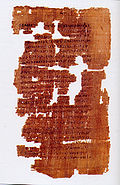
Back Pseudo-Titus-Brief German Épître du pseudo-Titus French Brief fan Pseudo-Titus Frisian Lettera dello Pseudo-Tito Italian Sahte Titus Mektubu Turkish
This article has an unclear citation style. (June 2020) |
| Part of a series on |
| New Testament apocrypha |
|---|
 |
|
|
The Epistle of Pseudo-Titus is a letter attributed to Titus, a companion of Paul of Tarsus, to an unidentified ascetic community of Christian men and women. It commends the life of chastity and condemns all sexual activity, even that within marriage, as sinful.[1] The epistle is classified under the Apocryphal New Testament and survives only in the Codex Burchardi, an eighth-century Latin manuscript, discovered in 1896 among the homilies of Caesarius of Arles.[2][3] The Latin epistle contains many solecisms which originated with an author who lacked proficiency with Latin and Greek.[4] The origins of the epistle remain unclear, however, it contains strong features of encratism.[5] It may have connections with the Priscillianist movement in fifth century Spain.[6][7]
- ^ Bart D. Ehrman, Lost Christianities: The Battles for Scripture and the Faiths We Never Knew (New York: Oxford University Press, 2003), xiv, 9.
- ^ E. Hennecke, New Testament Apocrypha, ed. W. Schneemelcher, Eng. trans. ed. R. McL. Wilson, 2 vols. (London, 1963 and 1965).
- ^ J. K. Elliott, The Apocryphal New Testament: A Collection of Apocryphal Christian Literature in an English Translation Based on M.R. James (Oxford: Clarendon Press, 2009).
- ^ E. Hennecke, New Testament Apocrypha, ed. W. Schneemelcher, Eng. trans. ed. R. McL. Wilson, 2 vols. (London, 1963 and 1965).
- ^ Cornelia B. Horn, "The Pseudo-Clementine Homilies and the Challenges of the Conversion of Families," Lectio Difficilior (2/2007), accessed November 15, 2011.
- ^ E. Hennecke, New Testament Apocrypha, ed. W. Schneemelcher, Eng. trans. ed. R. McL. Wilson, 2 vols. (London, 1963 and 1965).
- ^ J. K. Elliott, The Apocryphal New Testament: A Collection of Apocryphal Christian Literature in an English Translation Based on M.R. James (Oxford: Clarendon Press, 2009).
© MMXXIII Rich X Search. We shall prevail. All rights reserved. Rich X Search